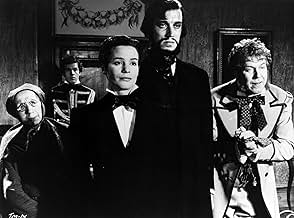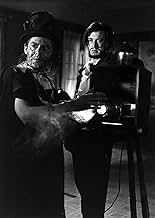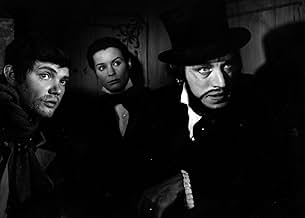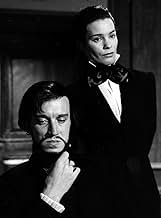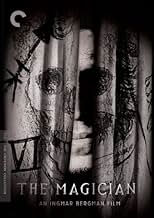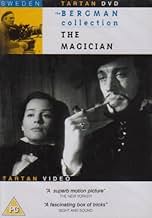NOTE IMDb
7,5/10
12 k
MA NOTE
Ajouter une intrigue dans votre langueA traveling magician and his assistants are persecuted by authorities in Sweden of the 19th century. Their capture, however, didn't bring victory to those in power.A traveling magician and his assistants are persecuted by authorities in Sweden of the 19th century. Their capture, however, didn't bring victory to those in power.A traveling magician and his assistants are persecuted by authorities in Sweden of the 19th century. Their capture, however, didn't bring victory to those in power.
- Réalisation
- Scénario
- Casting principal
- Nomination aux 1 BAFTA Award
- 3 victoires et 2 nominations au total
Frithiof Bjärne
- Border Officer
- (non crédité)
Tor Borong
- Border Officer
- (non crédité)
Avis à la une
8sol-
An appropriately mysterious Gothic tale with fascinating characters, who may or may not actually possess certain powers, the material is envisioned well by Ingmar Bergman, with careful attention to lighting design, and the acting is superb. Max Von Sydow is given the most intriguing part to play, and he pulls it off well, but Ingrid Thulin and Naima Wifstrand both deserve mentions for breathing life into their fey characters too. The film is about illusions ultimately, and those who are too critical to suspend their disbelief. It is a bit hard though interpreting exactly what Bergman intended by some of the oddities that he has placed in, such as dispersing poison to a young man. Are these attempts to add humour to the tale? Even with these odd inclusions and rushed ending that is a let down, it is quite a satisfying film overall. The music is great, the acting is excellent, and the interesting characters help make this film one of Bergman's most intriguing pieces.
Vogler's Magnetic Health Theater rolls into town and is promptly summoned for a meet with the town big wigs. Hoping to expose all involved in the theatre as charlatans, the disbelievers request a personal show before allowing the show to go public. With very interesting results.
There is a belief amongst many Ingmar Begman fans that Ansiktet (The Magician) is far too accessible a piece to be considered one of his greatest pieces. And whilst it does find Bergman more easy to understand for the casual viewer, it's however still complex enough to thrill and niggle the mind in equal measure. Taking two factors that he very much adored, masks and magic, Bergman threads them off into various directions, and in the process testing us the audience as to just what to expect from the story. The mysterious wonder of it all is naturally aided by Bergman's use of light and shadowy trickery, symbols loom heavy without dampening the theme on offer, with nothing of course actually quite being as it seems.
As is normally the case under the master director, the cast are uniformally strong. With Gunnar Bjornstrand and Ingrid Thulin particularly standing out. But really this is all about tricks and ideas relating to magic and its blending in with reality. So much so that with the end comes an awakening that we the audience are indeed props in one of Bergman's shows, and that can never be a bad or even an accessible thing.
A fascinating picture from a very fascinating director. 8/10
There is a belief amongst many Ingmar Begman fans that Ansiktet (The Magician) is far too accessible a piece to be considered one of his greatest pieces. And whilst it does find Bergman more easy to understand for the casual viewer, it's however still complex enough to thrill and niggle the mind in equal measure. Taking two factors that he very much adored, masks and magic, Bergman threads them off into various directions, and in the process testing us the audience as to just what to expect from the story. The mysterious wonder of it all is naturally aided by Bergman's use of light and shadowy trickery, symbols loom heavy without dampening the theme on offer, with nothing of course actually quite being as it seems.
As is normally the case under the master director, the cast are uniformally strong. With Gunnar Bjornstrand and Ingrid Thulin particularly standing out. But really this is all about tricks and ideas relating to magic and its blending in with reality. So much so that with the end comes an awakening that we the audience are indeed props in one of Bergman's shows, and that can never be a bad or even an accessible thing.
A fascinating picture from a very fascinating director. 8/10
I've seen a lot of Ingmar Bergman films and sometimes I don't want to see one of his films about death or mental illness. Well, starting in the 1960s to the 1980s, these were the main themes of his movies, but in some of his earlier films, these are not so pervasive--such as the movies The Devil's Eye (a comedy) and The Magician ("Ansiktet"). Because of this, they may be more approachable to the average viewer who would balk at the much more serious tone of such classics as Through a Glass Darkly (deep depression), Persona (mental illness), Autumn Sonata (repressed anger and abandonment), The Seventh Seal (death and the plague) or Fanny and Alexander (child abuse and emotional neglect).
The story is about a traveling group of hoaxters who put on a show combining magic and "animal magnetism" (i.e., an early name given to hypnosis). When they arrive at a Swedish town, they are forced to come to an audience with the local official and his cronies who want to prove that the act is a fraud. Bergman really doesn't try to resolve this issue, but instead shows how the town officials are really rather petty and mean people. How this traveling group deftly survives this encounter is the main focus of the movie. I especially liked the portion of the movie about the autopsy. It sounds gross, but I thought it was actually kind of funny. One of the officials is a cold and rather nasty doctor who longs for a chance to do an autopsy on the hypnotist. He gets far more than he bargains for--that's all I really want to say--otherwise it might ruin the suspense.
So, overall I liked the movie. It was not great but well acted and not the least bit depressing.
The story is about a traveling group of hoaxters who put on a show combining magic and "animal magnetism" (i.e., an early name given to hypnosis). When they arrive at a Swedish town, they are forced to come to an audience with the local official and his cronies who want to prove that the act is a fraud. Bergman really doesn't try to resolve this issue, but instead shows how the town officials are really rather petty and mean people. How this traveling group deftly survives this encounter is the main focus of the movie. I especially liked the portion of the movie about the autopsy. It sounds gross, but I thought it was actually kind of funny. One of the officials is a cold and rather nasty doctor who longs for a chance to do an autopsy on the hypnotist. He gets far more than he bargains for--that's all I really want to say--otherwise it might ruin the suspense.
So, overall I liked the movie. It was not great but well acted and not the least bit depressing.
Many people may have missed the satisfaction of reading the extra layer of meaning in this film: that the "magician" is the the filmmaker or visa versa, in this case Bergman himself. Without giving anything of the plot away, I can say that The Magician is a reflection on Bergamn's role as a creator of illusions. He uses the story of a roving theatrical troupe with an magician to illuminate the metaphor. The apparently abrupt turn of events at the end is Bergman's signal that he is the master of your perceptions in this medium, that he compares to the experience of dreaming.
It is interesting to compare this film with Fellini's 8 1/2, another filmmaker's reflection on the process and meaning of film-making. Two very different sensibilities are at work in these two films, but with surprisingly close parallels in their endings, and involuted plots.
I found this film highly satisfying on many levels, even taken at its apparent face value, as a romp. Seen a second time the illusionist begins to emerge more clearly, from the moment the film opens, with the lighting of the arc lamp of a film projector.
It is interesting to compare this film with Fellini's 8 1/2, another filmmaker's reflection on the process and meaning of film-making. Two very different sensibilities are at work in these two films, but with surprisingly close parallels in their endings, and involuted plots.
I found this film highly satisfying on many levels, even taken at its apparent face value, as a romp. Seen a second time the illusionist begins to emerge more clearly, from the moment the film opens, with the lighting of the arc lamp of a film projector.
Most of Ingmar Bergman's films are meant to titillate the intellect. The Magician is no exception. It is rich with symbolism. I think it ranks right up there with "Death in Venice" on the list of misunderstood movies.
I believe the most rewarding level of meaning in "The Magician" is the religious one. Bergman was often concerned with the implications of religious beliefs. And almost always from the attitude of doubt. Consider the lines in The Seventh Seal where the vicious monk, annoyed with the knight's persistence, asks, "Will you never stop asking questions?" and the knight replies resolutely, "No. Never."
Watching this movie with the idea of Vogler as Jesus provides a perspective that informs the characters and their conduct. This melancholy magician, doubted and persecuted by the powerful, surrounded by strange and suspicious persons, is simultaneously visionary and earthy flesh and blood. He only wants to perform his miracles for the masses. Or is he a charlatan? What a powerful way to pose that question.
I believe the most rewarding level of meaning in "The Magician" is the religious one. Bergman was often concerned with the implications of religious beliefs. And almost always from the attitude of doubt. Consider the lines in The Seventh Seal where the vicious monk, annoyed with the knight's persistence, asks, "Will you never stop asking questions?" and the knight replies resolutely, "No. Never."
Watching this movie with the idea of Vogler as Jesus provides a perspective that informs the characters and their conduct. This melancholy magician, doubted and persecuted by the powerful, surrounded by strange and suspicious persons, is simultaneously visionary and earthy flesh and blood. He only wants to perform his miracles for the masses. Or is he a charlatan? What a powerful way to pose that question.
Le saviez-vous
- AnecdotesThe character of Vogler was based on Bergman himself.
- Gaffes(at about 13 mins) When Tubal gets on in a carriage, a policeman hangs outside the carriage door but in the very next shot, the policeman is again seen to hang on the same door.
- Citations
Dr. Vergerus, Minister of Health: Either this is a dream or I'm losing my mind. Since It's inconceivable that I've lost all reason, I'll just wait till I wake up.
- ConnexionsFeatured in Premio Donostia a Max Von Sydow (2006)
Meilleurs choix
Connectez-vous pour évaluer et suivre la liste de favoris afin de recevoir des recommandations personnalisées
- How long is The Magician?Alimenté par Alexa
Détails
- Durée
- 1h 41min(101 min)
- Couleur
- Mixage
- Rapport de forme
- 1.33 : 1
Contribuer à cette page
Suggérer une modification ou ajouter du contenu manquant

